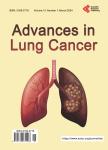Radiation-Induced Lung Cancers in Murine Models
Radiation-Induced Lung Cancers in Murine Models作者机构:Department of Environmental Health Sciences University of California Los Angeles USA
出 版 物:《Advances in Lung Cancer》 (肺癌(英文))
年 卷 期:2014年第3卷第2期
页 面:38-44页
学科分类:1002[医学-临床医学] 100214[医学-肿瘤学] 10[医学]
主 题:Radiation Carcinogenesis Animal Models Radiation Protectors Radiation Mitigators Secondary Cancers
摘 要:Radiation therapy is a key weapon in the modern arsenal of cancer treatment. However, this effective treatment comes with risks of its own, and the sheer number of patients that undergo radiation as a part of their therapy regimen is only increasing. As this number increases, so does the incidence of secondary, radiation-induced neoplasias, creating a need for therapeutic agents targeted specifically towards reduction in the incidence of and treatment of these cancers. Development and efficacy testing of these agents requires not only extensive?in vitro?testing, but also a set of reliable animal models to accurately recreate the complex situations of radiation-induced carcinogenesis. The laboratory mouse?Mus musculus?remains the most relevant animal model in cancer research due to the molecular and physiological similarities it shares with man, its small size and high rate of breeding in captivity, and its fully sequenced genome. In this work, we review relevant?M. musculusinbred and?F1?hybrid animal models, as well as methods of induction of radiation-induced lung cancers. Associated molecular pathologies are also included.



